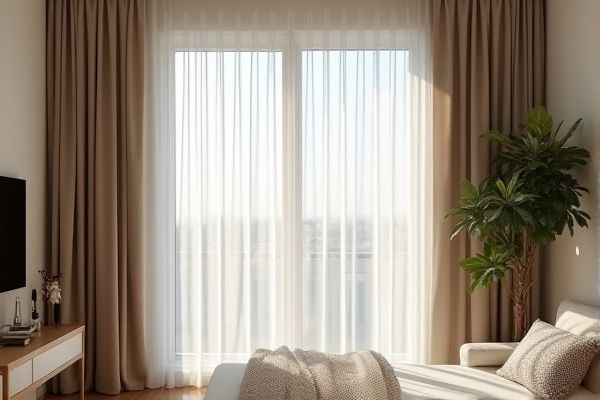
Privacy drapes provide full coverage and are typically used around hospital beds to create a private space, while privacy panels are rigid, movable partitions that offer more structured separation in various environments. Discover how each option can best protect Your personal space and enhance comfort by reading the full article.
Table of Comparison
| Feature | Privacy Drape | Privacy Panel |
|---|---|---|
| Material | Fabric or vinyl drape | Rigid or semi-rigid panels (wood, plastic, metal) |
| Installation | Easy, often hanging from ceiling or frame | Fixed or modular, requires mounting |
| Portability | Highly portable and adjustable | Less portable, usually stationary |
| Privacy Level | Moderate, blocks view but may allow sound | High, blocks view and offers better sound barrier |
| Use Cases | Temporary privacy in hospitals, offices | Permanent partitions in offices, clinics, homes |
| Cost | Lower cost | Higher cost |
| Maintenance | Easy to clean and replace | Requires occasional cleaning and upkeep |
Introduction to Privacy Drapes and Privacy Panels
Privacy drapes are fabric-based coverings designed to provide flexible, temporary visual barriers in homes or offices, enhancing personal privacy and light control. Privacy panels, typically made from rigid materials like glass, acrylic, or wood, offer permanent or semi-permanent partitions that improve room division and sound insulation. Choosing between a privacy drape and a privacy panel depends on your need for mobility, aesthetic preference, and the level of privacy required in your space.
Key Differences Between Privacy Drapes and Privacy Panels
Privacy drapes offer flexible, fabric-based coverage that can be easily moved or adjusted, providing temporary privacy in various settings. Privacy panels are rigid, fixed structures designed for consistent, permanent separation, often used in office spaces or medical facilities. Your choice depends on whether you need adaptable privacy solutions or stable, structural barriers.
Material Comparison: Drapes vs Panels
Privacy drapes are typically made from dense, woven fabrics such as polyester, cotton blends, or blackout materials that effectively block light and provide sound insulation. Privacy panels often utilize materials like acrylic, polycarbonate, or tempered glass combined with fabric inserts, offering a firmer structure and enhanced durability. While drapes provide softness and flexibility, panels deliver more rigid privacy solutions with easy maintenance and modern aesthetics.
Privacy Levels: Effectiveness of Drapes versus Panels
Privacy drapes provide full or near-complete visual obstruction by covering entire windows, blocking outside views and ensuring high privacy levels in residential and commercial spaces. Privacy panels, often made of frosted glass or acrylic, offer partial privacy by diffusing light and obscuring details while allowing some visibility, making them suitable for office partitions and shared environments. Drapes generally achieve higher effectiveness in privacy control due to their solid fabric and adjustable coverage compared to the semi-transparent nature of privacy panels.
Installation and Maintenance Requirements
Privacy drapes require minimal installation, often involving simple curtain rods or hooks, making them easy to set up and replace. Privacy panels typically demand more complex installation, including mounting brackets or frames, which may necessitate professional assistance and more time. Your choice should consider maintenance needs as drapes require regular washing, while panels can be wiped clean, influencing long-term upkeep and durability.
Aesthetic and Design Options
Privacy drapes offer versatile aesthetic options with various fabric textures, colors, and patterns that can complement both traditional and modern interiors. Privacy panels provide a sleek, structured look with materials like frosted glass, wood, or metal, making them ideal for minimalist and contemporary design schemes. Both options can be customized, but panels often allow for more architectural integration, while drapes excel in softness and flexibility.
Cost Analysis: Privacy Drapes vs Privacy Panels
Privacy drapes typically offer a more cost-effective solution compared to privacy panels, with average expenses ranging from $50 to $150 per unit, while privacy panels can cost between $200 and $600 depending on materials and design. Installation and maintenance costs for privacy drapes are lower due to their simpler mounting systems and replaceable fabric, whereas privacy panels often require professional installation and more extensive upkeep. The overall investment in privacy panels tends to be higher but offers greater durability and structural stability, potentially reducing long-term replacement expenses.
Common Applications in Healthcare and Office Settings
Privacy drapes provide flexible, temporary barriers commonly used in healthcare settings for patient confidentiality during examinations or procedures, offering easy mobility and repositioning. Privacy panels are more rigid and often installed in office environments to create semi-permanent partitions that reduce distractions and enhance personal workspace privacy. Your choice between a drape or panel depends on whether you need adaptable coverage in medical contexts or defined, stationary divisions in office layouts.
Durability and Longevity Comparison
Privacy drapes are typically made from heavy fabrics that offer moderate durability but may wear out faster due to frequent handling and exposure to sunlight. Privacy panels, constructed from sturdy materials like acrylic, wood, or metal, provide superior durability and longer lifespan, maintaining structural integrity with minimal maintenance. For long-term use in both residential and commercial settings, privacy panels are a more resilient choice, ensuring consistent performance over time.
Choosing the Right Privacy Solution for Your Needs
Privacy drapes offer flexible, temporary coverage ideal for quick setup and versatile use, while privacy panels provide a more permanent and structured solution tailored for defined spaces. When choosing the right privacy solution, consider your specific environment, desired level of privacy, and ease of installation to ensure optimal functionality. You can enhance your space's privacy effectively by selecting a solution that aligns with both your practical needs and aesthetic preferences.
 homyna.com
homyna.com